Every year in early autumn, the Netherlands Film Festival (NFF) takes place. For ten days, the city of Utrecht is the cinema capital of the Netherlands, and we join the fun with our own Unofficial Dutch Film Star Postcards Festival (UDFSPF). Today we feature a Duch non-actor and strongman who became a film star by accident. 10th-dan judoka Anton Geesink (1934–2010) destroyed the myth of Japanese invincibility in judo by becoming the first non-Japanese judoka to win a world title in 1961. He was a three-time World Judo Champion (1961, 1964 and 1965), Olympic Gold Medalist (1964) and won 21 European championships. With his 1,98 m and 130 kilos, he was also an imposing figure in a few Dutch and Italian action films.
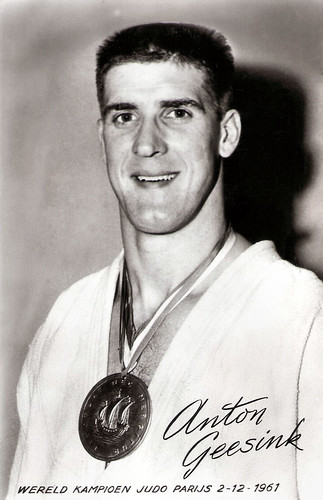
Dutch postcard by 't Sticht, Utrecht, no. AX 4883. Caption: Anton Geesink World Champion Judo Paris 2-12-1961.
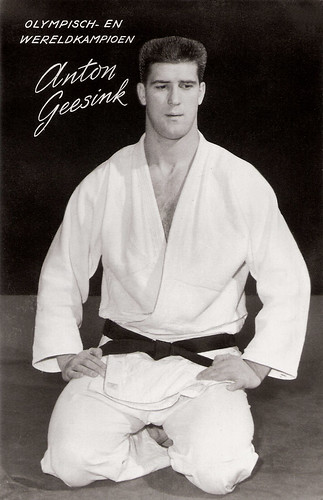
Dutch postcard by 't Sticht, Utrecht, no. 6040. Photo: J.J. Herschel jr.
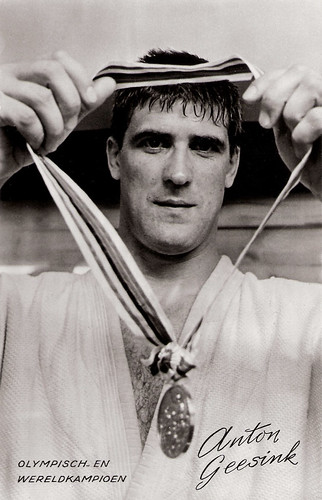
Dutch postcard by 't Sticht, Utrecht, no. 6049.
Antonius Johannes Geesink was born in Utrecht, The Netherlands in 1934. He first participated in the European Championships in 1951 and placed second in his category. The following year, he won his first European title. Through to 1967, twenty more European titles followed.
At the 1956 World Championships, Geesink was eliminated in the semi-finals against Yoshihiko Yoshimatsu. At the 1961 World Championships, Geesink became the World Champion in the open class, defeating the Japanese champion Koji Sone. Japanese judokas had won all the World Championship titles contested up to that point.
Judo debuted as an official sport at the 1964 Summer Olympics, which were held in the sport's home country, Japan. Anton Geesink provided one of the surprises of the Games by winning the open class through the defeat of Akio Kaminaga. Although Japan had won all other judo events, the loss of the blue riband open class saddened the hosts.
His reputation as a strongman won Geesink roles in a few European action films. He played a supporting part as a detective in the Dutch crime film Rififi in Amsterdam (Giovanni Korporaal, 1962) based on a novel by W.H. van Eemlandt. The film was a Dutch example of the Rififi films, a popular subgenre of French cinema in the 1950s. These were fast-moving crime films, full of familiar faces, fancy camera work and a couple of laughs. ‘Rififi’ was French slang for 'trouble in the underworld'. At IMDb, Chip Douglas reviews the film: “The result is as much fun as a Roger Corman film from the same period, perhaps even a bit classier.”
Geesink then starred in an early Spaghetti Western, Oklahoma John (Jaime Jesús Balcázar, Roberto Bianchi Montero, 1965) with Sabine Bethmann. Geesinks’s best-known film is probably the Italian Peplum I Grandi Condottieri/Great Leaders of the Bible (Marcello Baldi, Francisco Pérez-Dolz, 1965) with Fernando Rey, in which Geesink starred as the biblical superhero Samson.
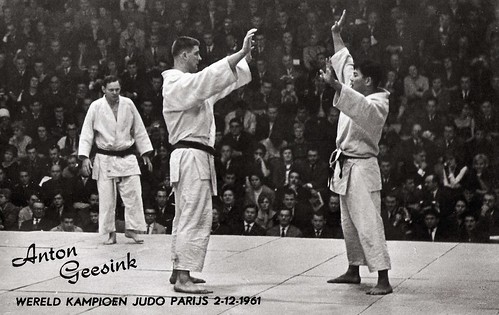
Dutch postcard by 't Sticht, Utrecht, no. AX 4884. Caption: Anton Geesink World Champion Judo Paris 2-12-1961. Tension during the match Anton Geesink - Koji Sone at the World Judo Championships in Paris.
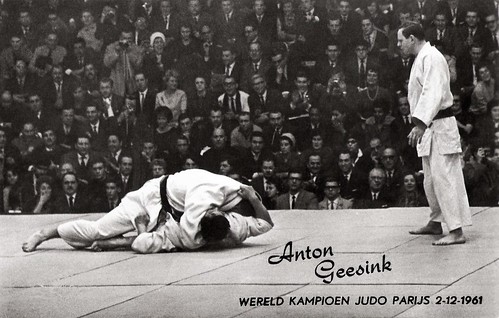
Dutch postcard by 't Sticht, Utrecht, no. AX 4886. Caption: Anton Geesink World Champion Judo Paris 2-12-1961. This headlock during the match against Koji Sone made Anton Geesink Judo the world champion during the world championships in Paris.
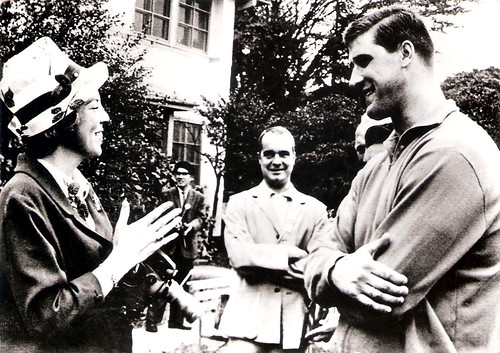
Dutch collectors card by Brio, no. 434, 1964. Caption: Princess Beatrix visited on the first day of her stay in Tokyo during the Games the Dutch department of the Olympic village and had a long and animated conversation with judo giant Anton Geesink.
After winning the 1965 World Championships and a last European title in 1967, Anton Geesink quit competitive judo. In October 1973, All Japan Pro Wrestling owner Giant Baba recruited Anton Geesink to join AJPW. Baba sent him to Amarillo, where TX, Dory Funk Jr. and Terry Funk trained him for a month. He worked for All Japan from 1973 to 1978, as a popular part-time wrestler.
Years after his short-lived film career, he re-appeared as an actor in some Dutch TV shows, such as the children’s series Pipo en de Noorderzon/Pipo and the Northern Sun (Wim Meuldijk, 1978) and the comedy series Zoals u wenst, mevrouw/As You Wish, Milady (Frans Boelen, 1984) with popular Dutch comedienne Carry Tefsen.
In 1986, Geesink was the first European judoka to receive the 9th-dan grade. A year later, he became a member of the board of the Dutch National Olympic Committee and a member of the International Olympic Committee (IOC). In 1999, he was among the IOC members suspected of accepting bribes during the scandal surrounding the election of Salt Lake City as the host of the 2002 Winter Olympics. Geesink's name was cleared by the IOC which nevertheless issued him a warning for the appearance of a conflict of interest which could have damaged the reputation of the IOC.
His reputation as a sportsman was never damaged, and in 1997 he received the 10th-dan. This made him one of the highest-graded judokas in the world. Only 18 people got ever a 10th-dan, and Geesink was one of the only three non-Japanese judokas who had this qualification. The International Judo Federation (IJF) placed him in their Hall of Fame in 2004.
At the age of 76, Anton Geesink died in 2010 in a hospital in his hometown Utrecht, where he lived above his own sports school in a street named after him, the Anton Geesinkstraat.
Anton Geesink at the 1961 World Championships. Source: beeld en geluid (YouTube).
Scene from I Grandi Condottieri/Great Leaders of the Bible (1965). Source: Joe36Xcel (YouTube).
Sources: Sports-reference.com, Wikipedia (Dutch and English), and IMDb.
This post was last updated on 10 May 2024.

Dutch postcard by 't Sticht, Utrecht, no. AX 4883. Caption: Anton Geesink World Champion Judo Paris 2-12-1961.

Dutch postcard by 't Sticht, Utrecht, no. 6040. Photo: J.J. Herschel jr.

Dutch postcard by 't Sticht, Utrecht, no. 6049.
Samson
Antonius Johannes Geesink was born in Utrecht, The Netherlands in 1934. He first participated in the European Championships in 1951 and placed second in his category. The following year, he won his first European title. Through to 1967, twenty more European titles followed.
At the 1956 World Championships, Geesink was eliminated in the semi-finals against Yoshihiko Yoshimatsu. At the 1961 World Championships, Geesink became the World Champion in the open class, defeating the Japanese champion Koji Sone. Japanese judokas had won all the World Championship titles contested up to that point.
Judo debuted as an official sport at the 1964 Summer Olympics, which were held in the sport's home country, Japan. Anton Geesink provided one of the surprises of the Games by winning the open class through the defeat of Akio Kaminaga. Although Japan had won all other judo events, the loss of the blue riband open class saddened the hosts.
His reputation as a strongman won Geesink roles in a few European action films. He played a supporting part as a detective in the Dutch crime film Rififi in Amsterdam (Giovanni Korporaal, 1962) based on a novel by W.H. van Eemlandt. The film was a Dutch example of the Rififi films, a popular subgenre of French cinema in the 1950s. These were fast-moving crime films, full of familiar faces, fancy camera work and a couple of laughs. ‘Rififi’ was French slang for 'trouble in the underworld'. At IMDb, Chip Douglas reviews the film: “The result is as much fun as a Roger Corman film from the same period, perhaps even a bit classier.”
Geesink then starred in an early Spaghetti Western, Oklahoma John (Jaime Jesús Balcázar, Roberto Bianchi Montero, 1965) with Sabine Bethmann. Geesinks’s best-known film is probably the Italian Peplum I Grandi Condottieri/Great Leaders of the Bible (Marcello Baldi, Francisco Pérez-Dolz, 1965) with Fernando Rey, in which Geesink starred as the biblical superhero Samson.

Dutch postcard by 't Sticht, Utrecht, no. AX 4884. Caption: Anton Geesink World Champion Judo Paris 2-12-1961. Tension during the match Anton Geesink - Koji Sone at the World Judo Championships in Paris.

Dutch postcard by 't Sticht, Utrecht, no. AX 4886. Caption: Anton Geesink World Champion Judo Paris 2-12-1961. This headlock during the match against Koji Sone made Anton Geesink Judo the world champion during the world championships in Paris.

Dutch collectors card by Brio, no. 434, 1964. Caption: Princess Beatrix visited on the first day of her stay in Tokyo during the Games the Dutch department of the Olympic village and had a long and animated conversation with judo giant Anton Geesink.
Part-time wrestler
After winning the 1965 World Championships and a last European title in 1967, Anton Geesink quit competitive judo. In October 1973, All Japan Pro Wrestling owner Giant Baba recruited Anton Geesink to join AJPW. Baba sent him to Amarillo, where TX, Dory Funk Jr. and Terry Funk trained him for a month. He worked for All Japan from 1973 to 1978, as a popular part-time wrestler.
Years after his short-lived film career, he re-appeared as an actor in some Dutch TV shows, such as the children’s series Pipo en de Noorderzon/Pipo and the Northern Sun (Wim Meuldijk, 1978) and the comedy series Zoals u wenst, mevrouw/As You Wish, Milady (Frans Boelen, 1984) with popular Dutch comedienne Carry Tefsen.
In 1986, Geesink was the first European judoka to receive the 9th-dan grade. A year later, he became a member of the board of the Dutch National Olympic Committee and a member of the International Olympic Committee (IOC). In 1999, he was among the IOC members suspected of accepting bribes during the scandal surrounding the election of Salt Lake City as the host of the 2002 Winter Olympics. Geesink's name was cleared by the IOC which nevertheless issued him a warning for the appearance of a conflict of interest which could have damaged the reputation of the IOC.
His reputation as a sportsman was never damaged, and in 1997 he received the 10th-dan. This made him one of the highest-graded judokas in the world. Only 18 people got ever a 10th-dan, and Geesink was one of the only three non-Japanese judokas who had this qualification. The International Judo Federation (IJF) placed him in their Hall of Fame in 2004.
At the age of 76, Anton Geesink died in 2010 in a hospital in his hometown Utrecht, where he lived above his own sports school in a street named after him, the Anton Geesinkstraat.
Anton Geesink at the 1961 World Championships. Source: beeld en geluid (YouTube).
Scene from I Grandi Condottieri/Great Leaders of the Bible (1965). Source: Joe36Xcel (YouTube).
Sources: Sports-reference.com, Wikipedia (Dutch and English), and IMDb.
This post was last updated on 10 May 2024.
No comments:
Post a Comment